Telex photojournalist Orsi Ajpek has been awarded in the competition created in memory of the former RTL editor and reporter Honorka Hégető, for her photos depicting the rehabilitation of Ukrainian soldiers wounded in the Russian-Ukrainian war. Anna Bánáti authored the article, with Serhiy Stukanov contributing to its preparation. Photographer Éva Keleti, one of the judges this year, said that she could not say more about the material than “what Orsi has already said with her photos, both spiritually and photographically.”
Research on the psychological health of demobilized soldiers has shown that those who have experienced war firsthand often feel a sharp divide between themselves and civilians who have not been through war. According to Daryna Cherniakova, a psychologist at a rehabilitation center in Kyiv, many soldiers find it difficult to interact with civilians, which also causes difficulties in their reintegration. “One of my patients put it this way: for him, there are two different worlds: one with those who were on the front lines, and the other with those who were not.”
By the summer of 2025, between 60,000 and 100,000 Ukrainian soldiers had died in the fighting, and more than 400,000 had been wounded. Not only do the professionals working in hospitals have to deal with unprecedented physical trauma, they also have to treat invisible injuries sustained by soldiers on the front lines, such as PTSD, depression, and grief.
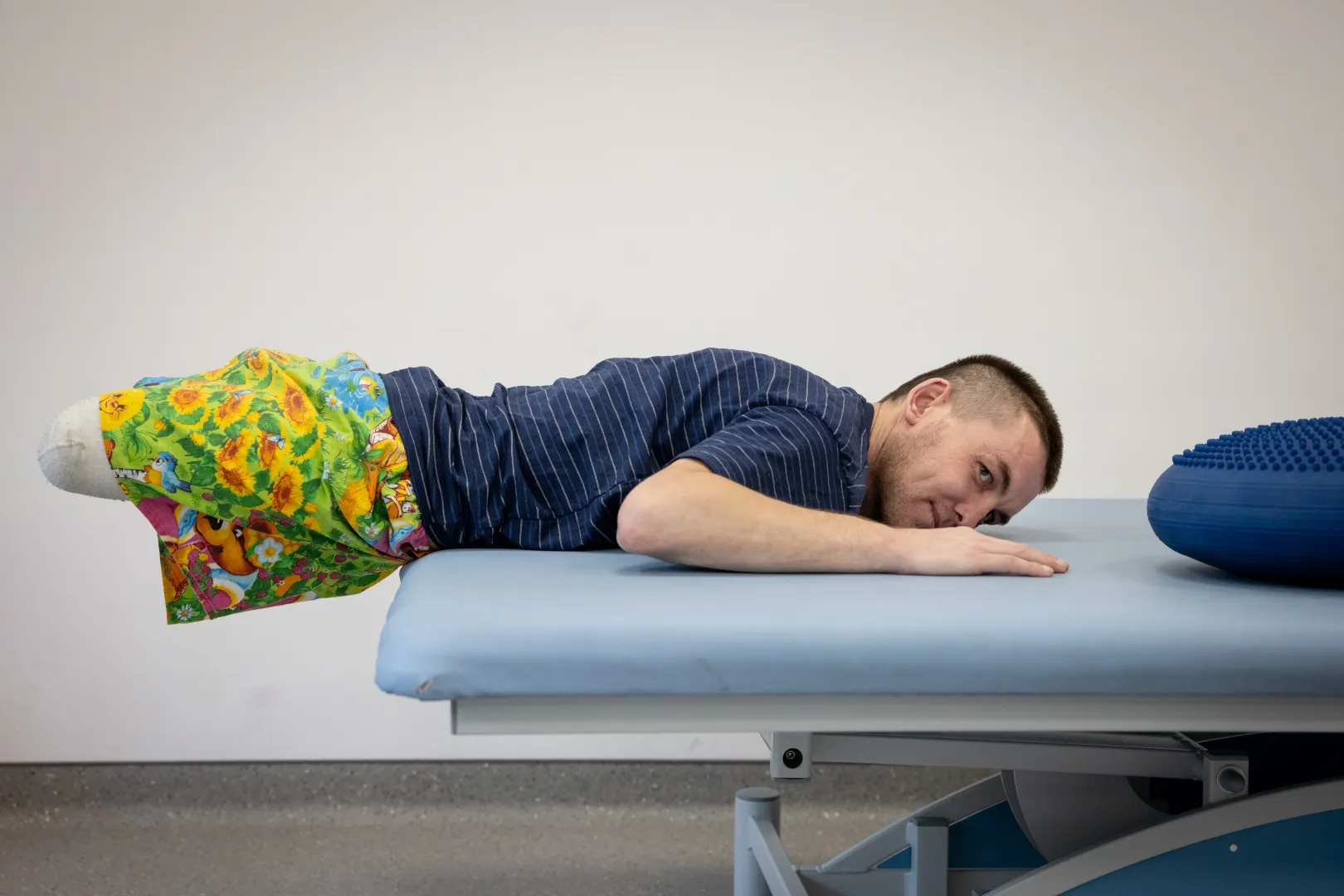
A wounded soldier undergoes physiotherapy at the Recovery Center in Kyiv on October 3, 2024. Wounded soldiers are not sent to the Recovery in Kyiv for surgery, but for rehabilitation. Some arrive here immediately after being evacuated from the front, while others are brought from military hospitals. Most of them are admitted with a serious concussion, a head or back injury, or the loss of a limb. Recovery maintains thirteen rehabilitation centers in Ukrainian state hospitals, which have treated a total of sixteen thousand wounded soldiers before the fall of 2024. The Ukrainian National Health Service covers the costs of all rehabilitation in public health institutions, including the time spent at Recovery. A rehabilitation is expected to last at least two weeks, but the average patient spends three to four weeks there, with each entitled to two to eight cycles per year, depending on their injury.
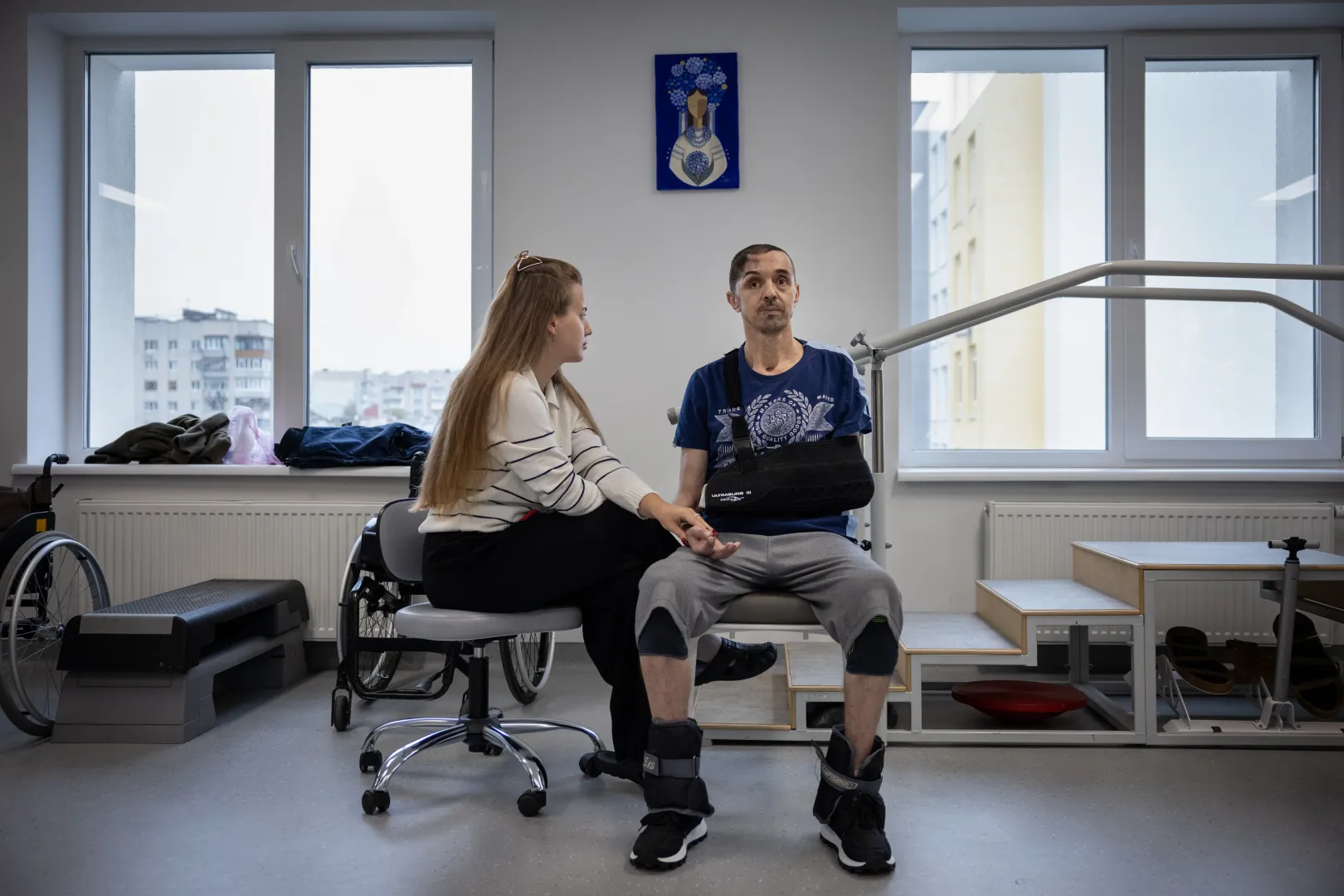
A soldier with a head injury holds hands with his daughter in the rehabilitation ward of the Unbroken hospital in Lviv on October 4, 2024. Unlike at Recovery, at Unbroken they also perform surgeries. According to Oleg Bilyansky, Unbroken's medical director, battlefield injuries are the most complicated cases that the doctors working there have ever dealt with. "There is never a case where someone arrives with only a simple fracture or concussion. I always think we've seen everything, but then something new comes along that we've never encountered before. We recently had a man who lost his sight, broke his spine, had to have a limb amputated, and had multiple bone fractures. All this in the body of just one person."
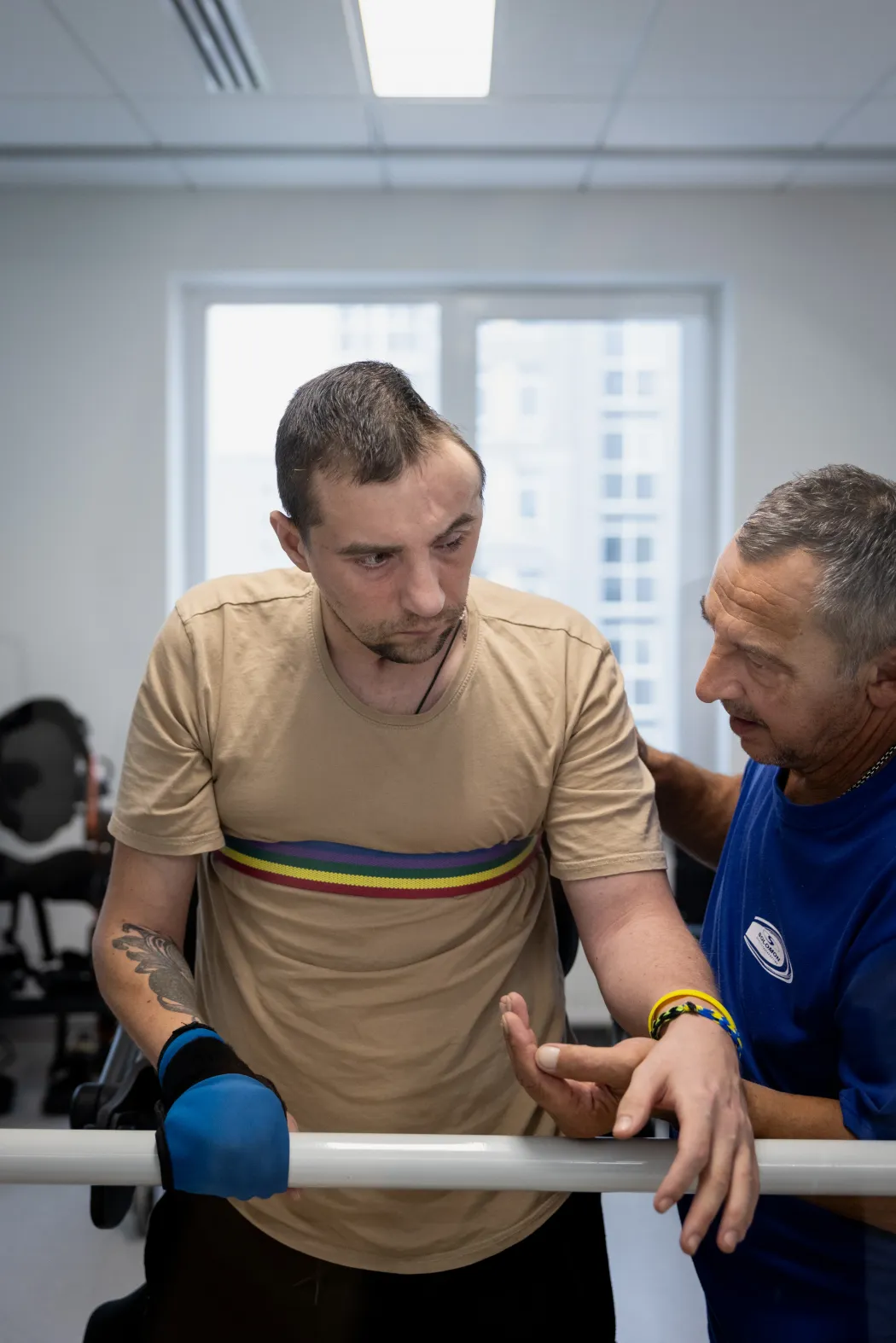
An injured soldier is helped by his father during a physiotherapy session at the Unbroken rehabilitation center in Lviv on October 4, 2024. Like Recovery, Unbroken is staffed with a team of experts in several fields, with five to ten doctors, speech therapists, physiotherapists, and psychologists working with each patient. The organization was established in the spring of 2022 on the initiative of local hospital administrators and the mayor of Lviv, after they realized that the capacity of the existing military hospitals and rehabilitation institutes would not be sufficient for the new war.
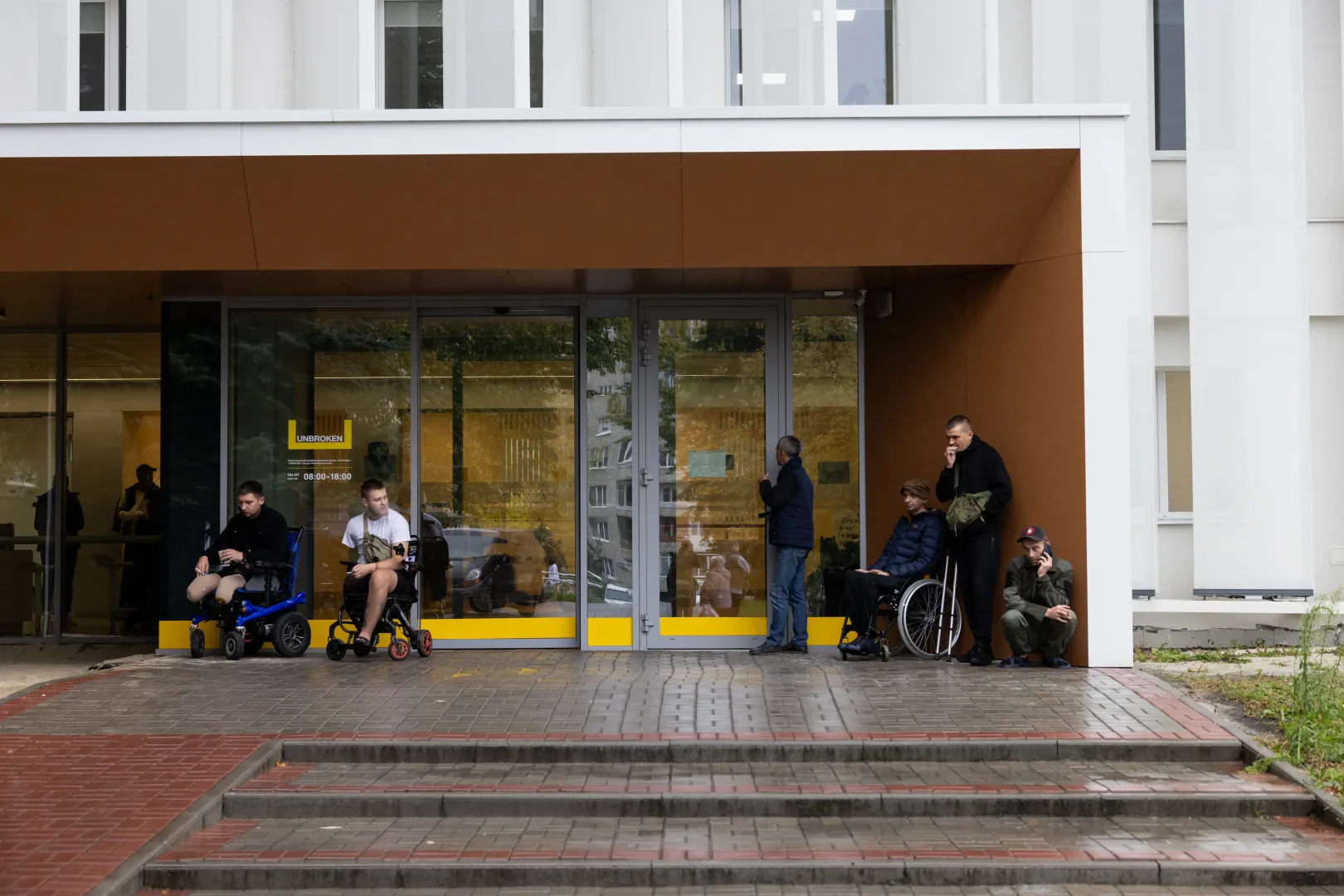
Soldiers treated at the hospital smoke in front of the main entrance of Unbroken in Lviv on October 4, 2024. Unbroken has a total capacity of 200–250 beds and has provided rehabilitation for 2,000 people so far. Since June 2022, they have also been able to provide prosthetic limbs manufactured in-house to aid in the recovery of those staying there.
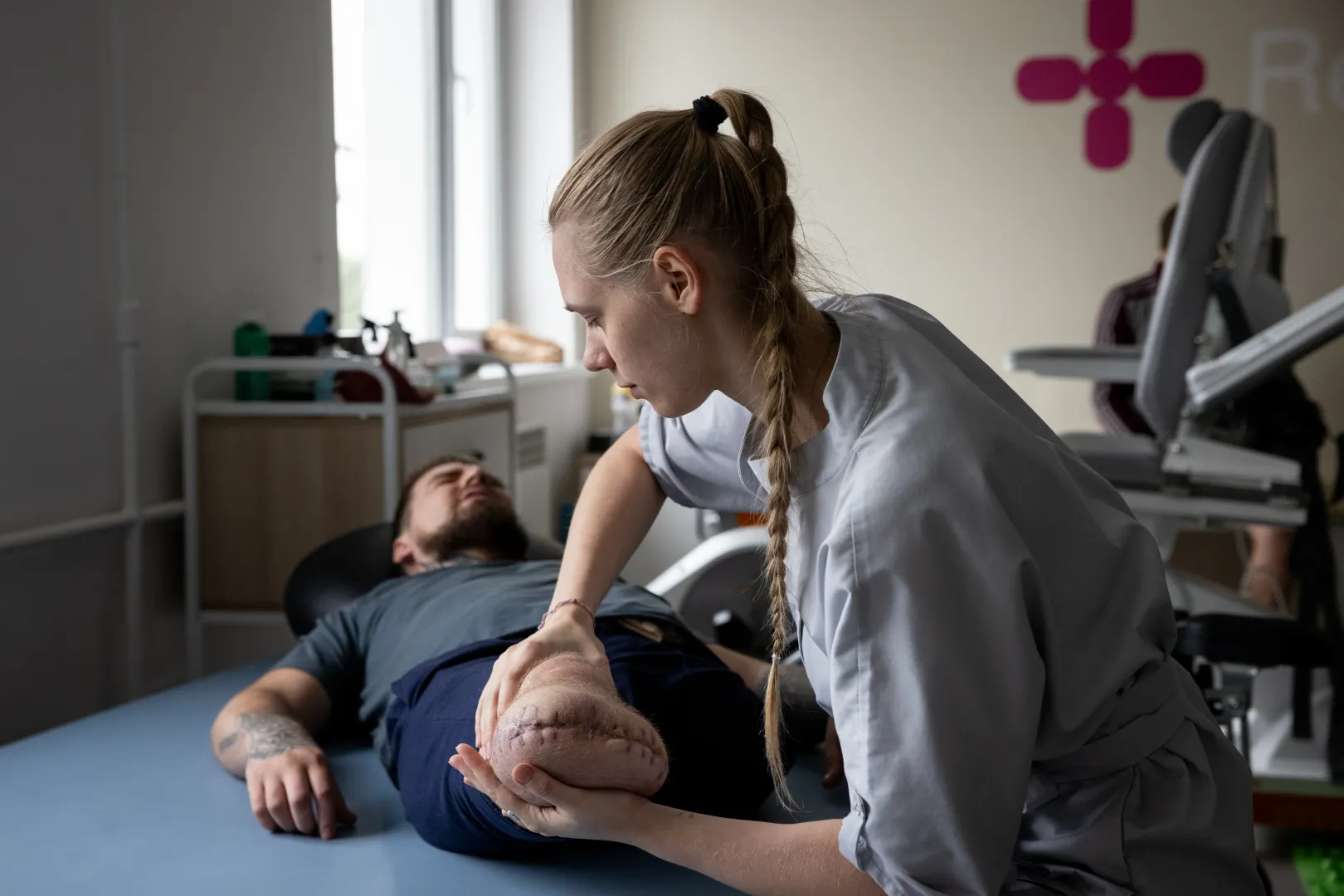
A physical therapist treats an injured soldier at the Recovery hospital in Kyiv on October 3, 2024. When an injured soldier arrives at Recovery, they are first examined thoroughly, and then a multidisciplinary team of doctors, physiotherapists, psychologists, psychotherapists, psychiatrists, and speech therapists is assembled to put together the rehabilitation process. One of the most important steps is to ask the patient what goals they would like to set for themselves during their recovery. Then, an appropriate treatment schedule is developed across the various specialties, and if necessary, additional experts are brought in, for instance, if someone needs a prosthetic limb.
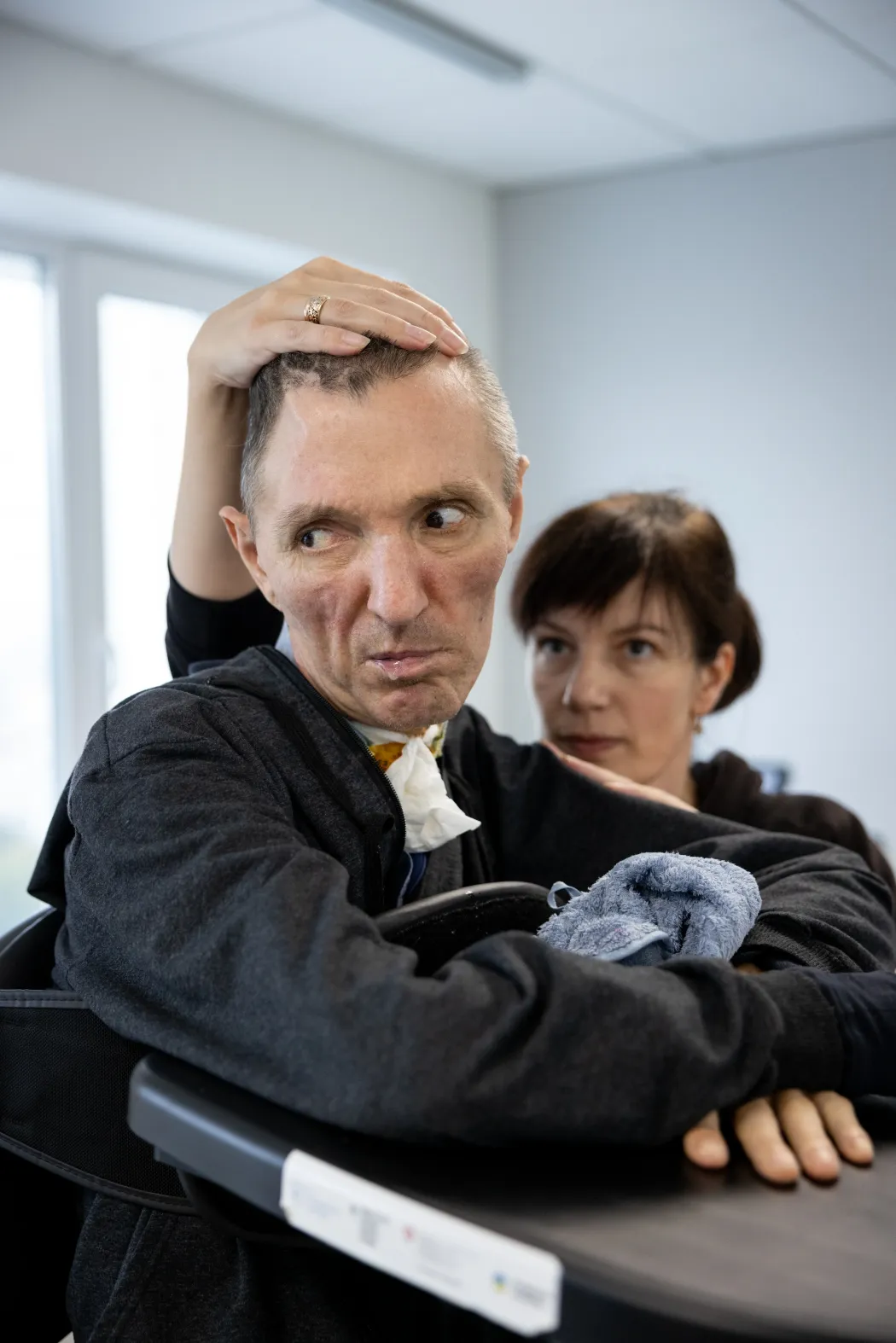
A relative assists an injured soldier in the physical therapy department of Unbroken on October 4, 2024. According to experts in psychology, the psychological state of those in the hospital depends largely on which stage of rehabilitation they are in. For those who were injured more recently, the main goal is to accept what their bodies are now able to do and what they are not. Those who were injured a while ago are focused more on how to reintegrate into society, how to communicate with their family members, or how to return to work.
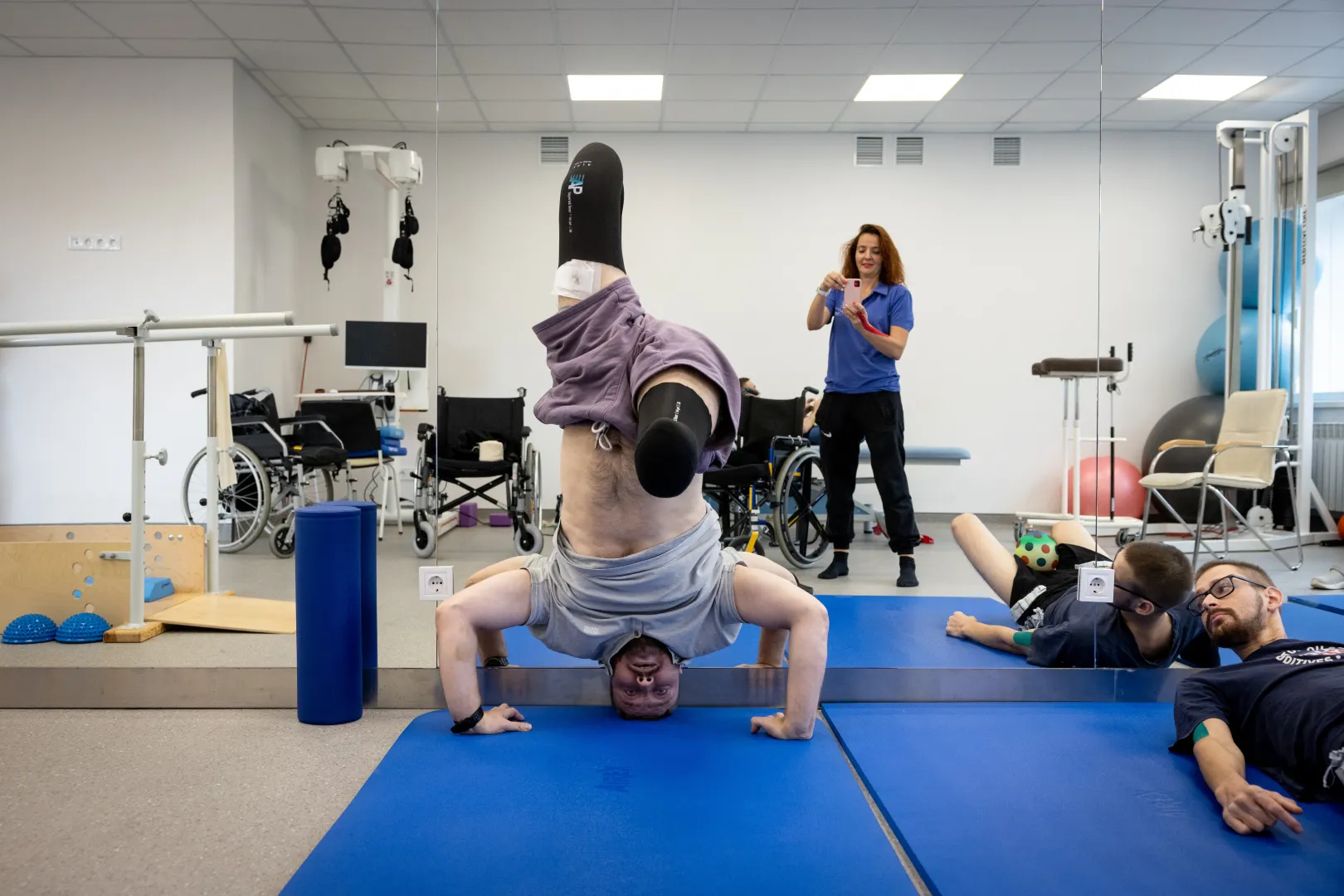
Soldiers with injured limbs during a physiotherapy session at the Recovery Center in Kyiv on October 3, 2024. Reintegration into society is primarily an issue for those injured who will not be returning to combat. For those who continue their service after rehabilitation, the most important goal is to stabilize their physical condition and treat any post-traumatic stress disorder (PTSD).
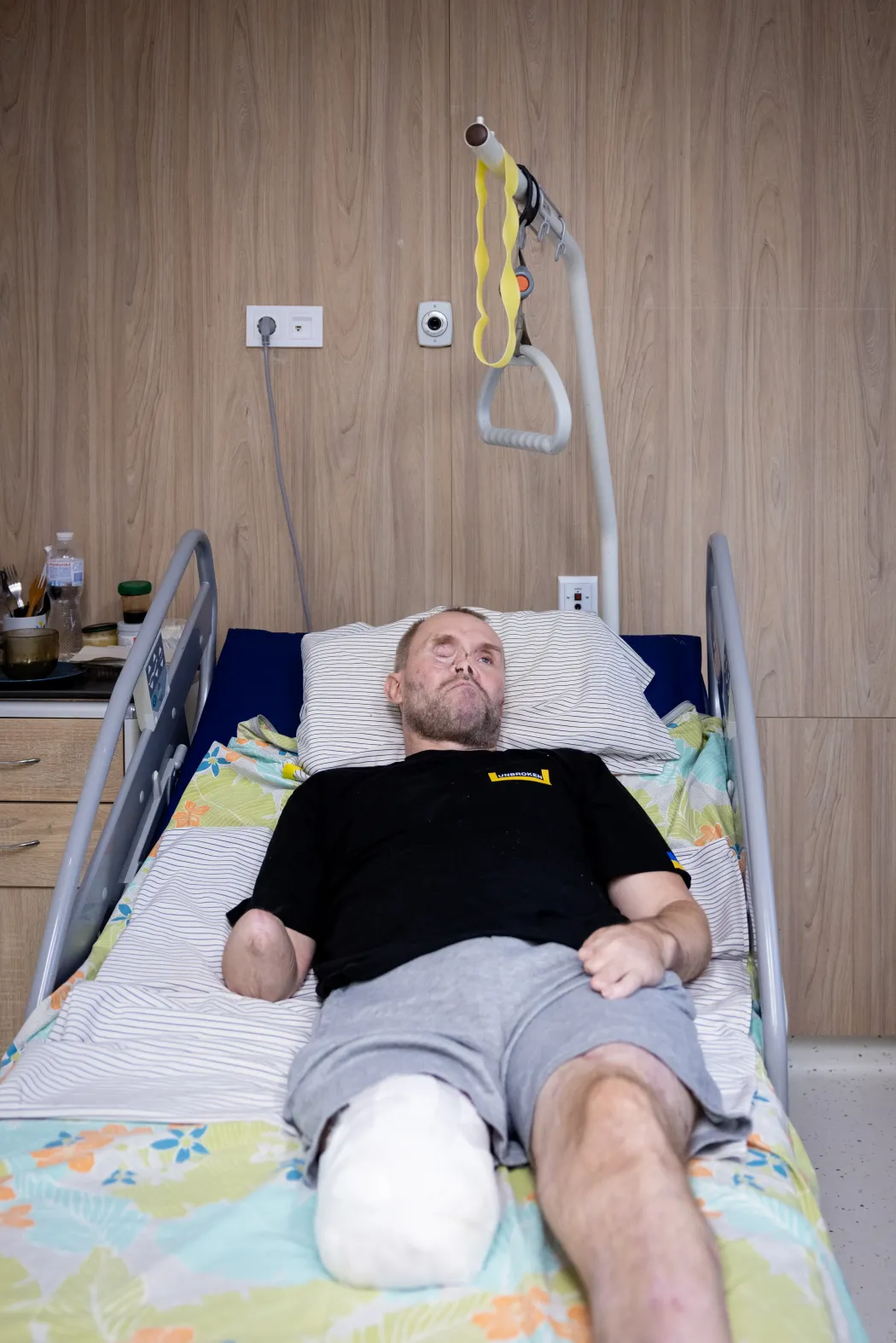
Volodymyr at the Unbroken rehabilitation center in Lviv on October 4, 2024. After a mine exploded, doctors were unable to save part of his face and limbs, and he also suffered severe hearing loss. Volodymyr has been at Unbroken for about a year and says that he feels completely normal physically, but it is a big challenge for him to live without legs and arms, and he finds it difficult to imagine what his life will be like now that he will never be able to hunt or dive again.
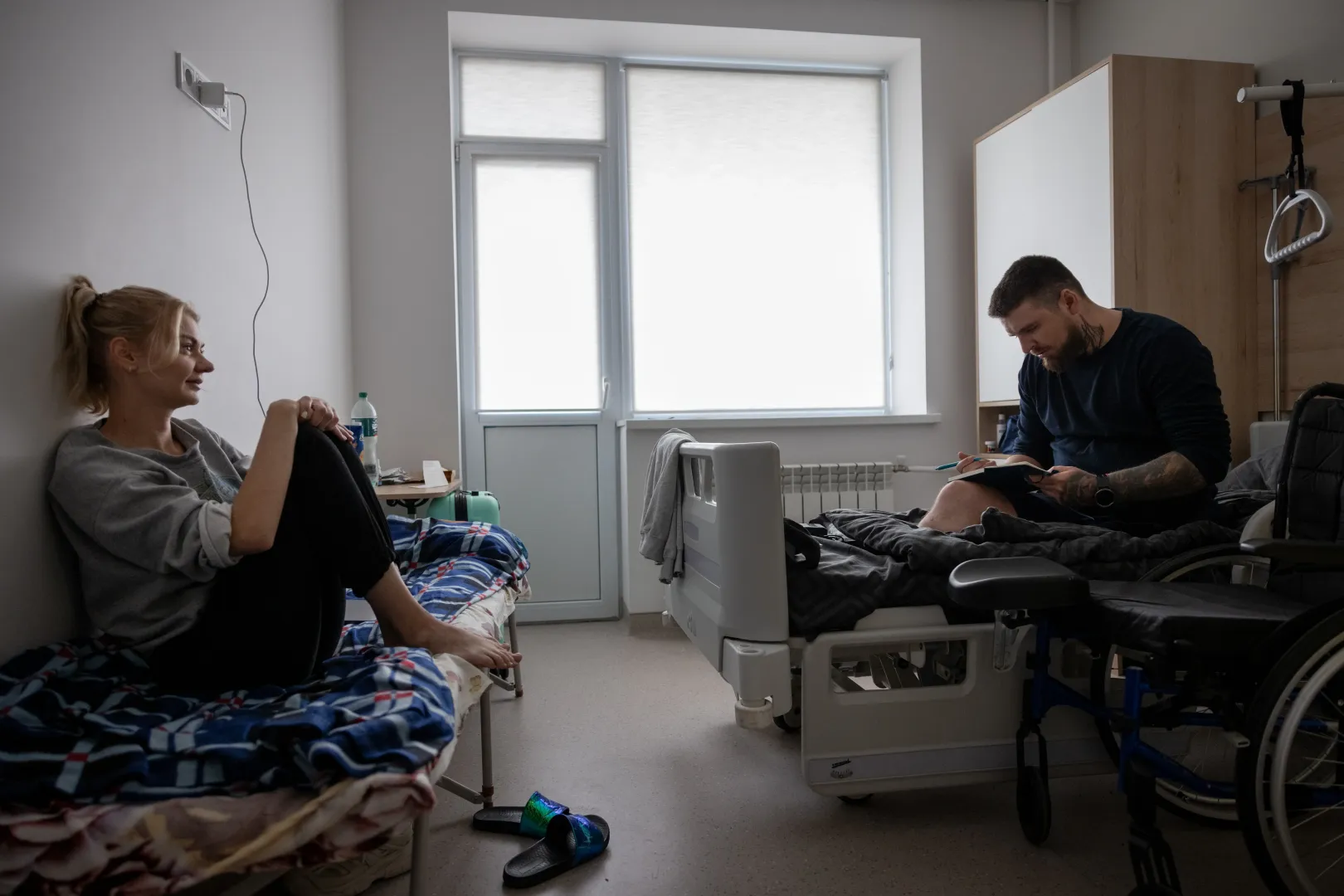
Dmytro and his fiancée in a ward at Recovery's Kyiv hospital on October 3, 2024. He was wounded in an artillery and drone attack and lost both his legs. "At first, after I was injured, I was depressed. I didn't know how I would live after that, I felt that no one would want me in this condition. I was also afraid that my fiancée would leave me. It is thanks to her that I am much better today." Recovery's psychologists are also working with the family members (many of whom are allowed to stay with their husbands or sons if they have serious physical injuries), because their mental state can greatly influence the rehabilitation process.
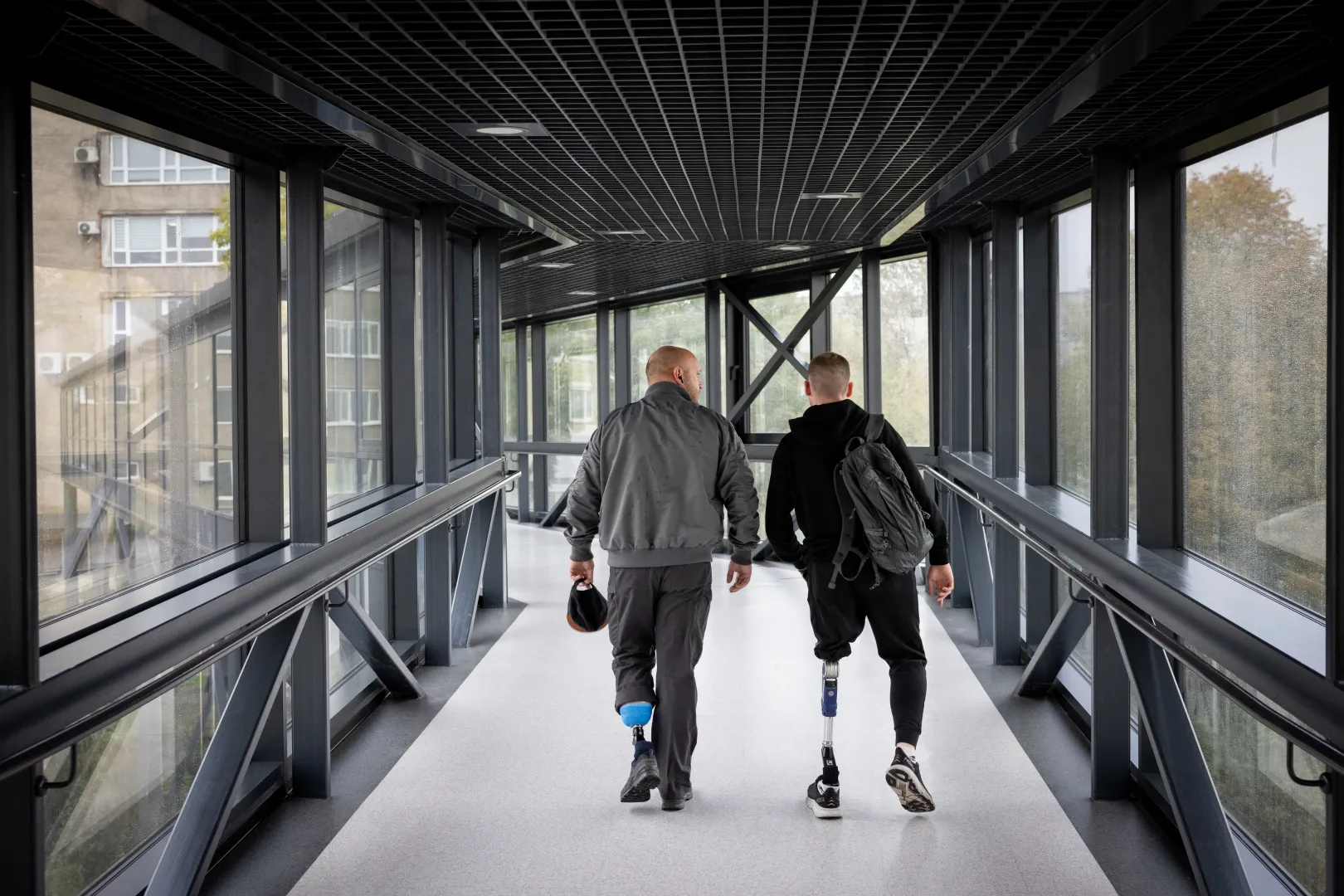
Injured soldiers arriving for a check-up at the Unbroken rehabilitation center in Lviv on October 4, 2024. According to the hospital's psychologist, it is a common misconception that rehabilitation is mainly about treating PTSD, as post-traumatic stress disorder does not affect everyone. Many struggle with anxiety, depression, aggression, and frustration about the future, but grief and guilt are also frequent. The reasons for the latter can vary: some feel guilty because they are recovering while others are still on the front lines, many struggle with the thought that they were unable to save a comrade, that they did not take good enough care of themselves or that their injuries are a burden to their families, and some feel that they did not do everything they could for their country. The feeling of loss is also a complex emotion, partly because many are grieving in several areas at once: they mourn their comrades who have fallen at the front, their own physical losses, their lost home, their city or their broken family.